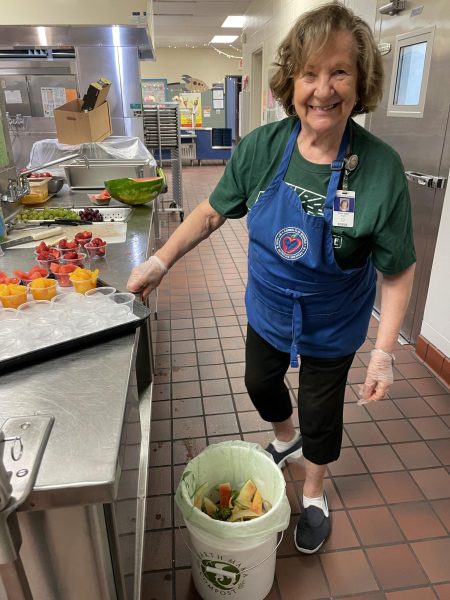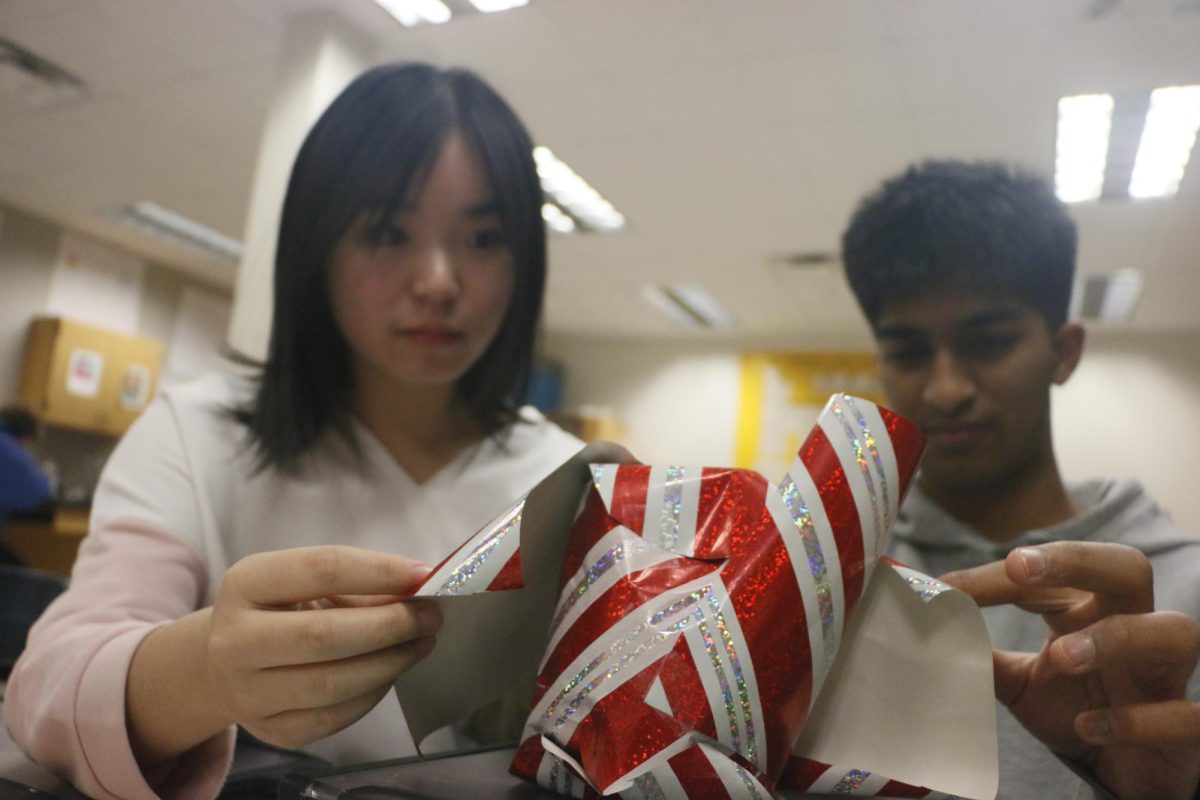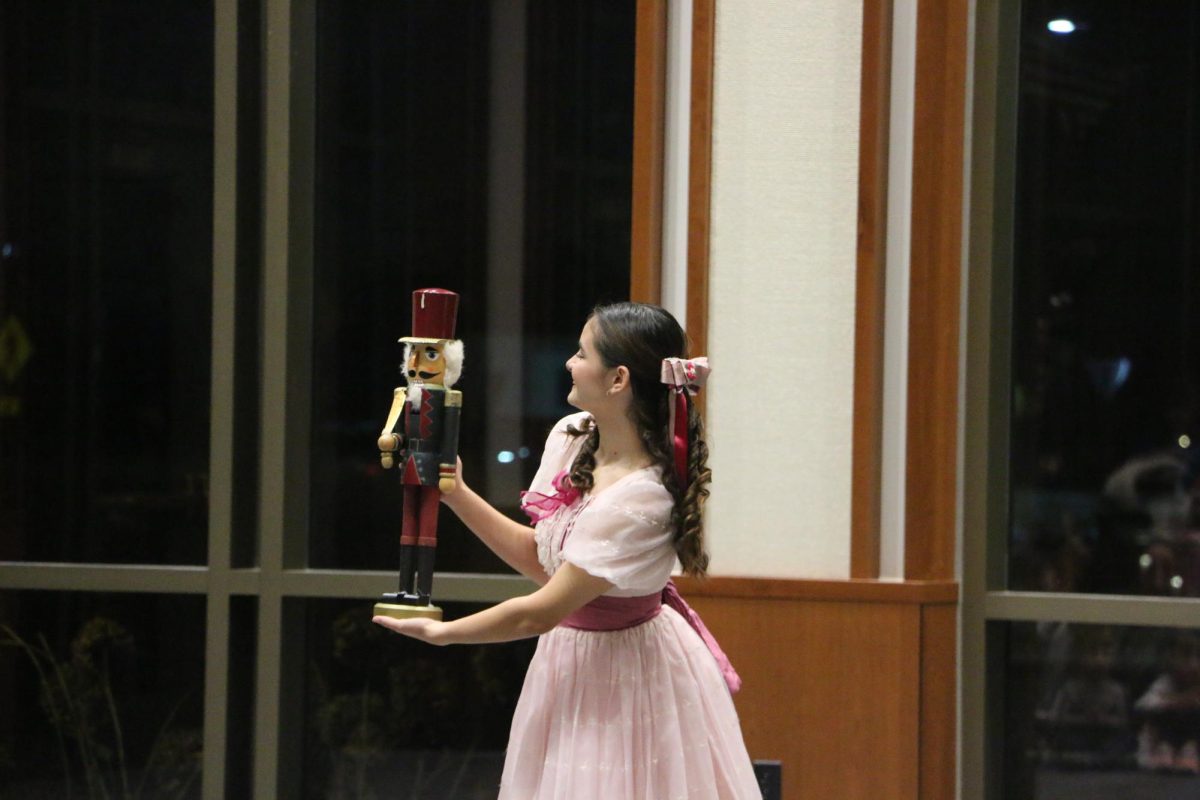 Meghan Wilson, CCS dietician and head of composting program
Meghan Wilson, CCS dietician and head of composting program
What can you tell me about the composting program?
We have 15 schools and 17 kitchens because, you know, there’s three cafeterias in the high school. So they come once a week and just pick up our compost and then typically they give compost dirt back to their clients. We haven’t figured out exactly what we’re going to do with that if we’re going to donate it to the school garden or anything like that.
How long has it taken to implement?
Mid-semester last year, I had applied for a grant through the Indiana Department of Environmental Management. They do a community recycling grant every year. I applied for that and got $15,000 to apply for the composting program. So over the summer, we just interviewed different composting companies and decided to go with a company called Earth Mama and they come to every single school in our district, well, every kitchen.
Why was it implemented and what gave you the idea to apply for the grant?
There have been students here at CHS who have been pushing for it and before COVID, we had started at main cafeteria and it was just a really good program, super easy for our staff to participate in. It’s just a nice way to help with recycling and the earth and environment.
What are some other steps Carmel’s taken to be more eco-friendly in the dietitian aspect of it?
So in most of our schools, we do real silverware. So we don’t use plastic silverware, which is a lot less waste. And then we have the school garden at Carmel Middle School. We don’t do as much with that anymore, just because the amount that comes out of the garden, the volume is just not going to be enough to serve an entire school. But, yeah the silverware and then the composting are probably our biggest ones.
How does the process work exactly?
The company we work with, Earth Mama, gives us just five gallon buckets and liners; they’re just compostable liners, and then when our kitchen staff is doing prep for lunch or breakfast, any excess food scraps, they just throw right into those buckets with the liners and then they just pick them up every week.
What has been the short term impact of the composting program?
The short term impact so far is just less waste. Custodians aren’t having to take out as much trash, it’s not as heavy. Right now they’re doing watermelons and cantaloupes and things that are in season, so just not having those big rinds in the trash cans has been helpful for our staff and for custodians dealing with trash.
What do you expect the long term impact to be of this program?
I’m hoping that it just creates awareness. Maybe even our staff can start composting at home and just kind of think it’s more environmentally friendly. Eventually, big picture, I would like to move it to the student side of the cafeteria. It’s just going to take a lot of training and a lot more prep, so we’re not there yet. That is the long-term goal, to have the entire school participating.
Anything else you’d like to add that I haven’t asked?
We’re still very early because we just started this year. We’re excited to keep it going and see if we can apply for more grants in the future or if it’s something that can just be rolled into our program costs, eventually.






























![Keep the New Gloves: Fighter Safety Is Non-Negotiable [opinion]](https://hilite.org/wp-content/uploads/2024/12/ufcglovescolumncover-1200x471.png)
















































![Video Review: Carmel BuffaLouie's [MUSE]](https://hilite.org/wp-content/uploads/2024/12/Screen-Shot-2024-12-24-at-2.08.33-PM-1200x685.png)
![Review: Dress to Impress’s Christmas update beats the Halloween update, checks all boxes [MUSE]](https://hilite.org/wp-content/uploads/2024/12/Dti-winter-update.webp)
![Review: "Moana 2": Is the storyline just as intense as advertised? [MUSE]](https://hilite.org/wp-content/uploads/2024/12/1-copy-1024x538-1.webp)
![Review: Celebrating its 15th season, “Bob’s Burgers” renders itself a fan favorite [MUSE]](https://hilite.org/wp-content/uploads/2024/12/bobs-burgers-tv.jpg)
![Review: “Family By Choice” is the perfect watch that encapsulates family, love and everything in between [MUSE]](https://hilite.org/wp-content/uploads/2024/12/family-by-choice-1.png)
![Review in Print: Maripaz Villar brings a delightfully unique style to the world of WEBTOON [MUSE]](https://hilite.org/wp-content/uploads/2023/12/maripazcover-1200x960.jpg)
![Review: “The Sword of Kaigen” is a masterpiece [MUSE]](https://hilite.org/wp-content/uploads/2023/11/Screenshot-2023-11-26-201051.png)
![Review: Gateron Oil Kings, great linear switches, okay price [MUSE]](https://hilite.org/wp-content/uploads/2023/11/Screenshot-2023-11-26-200553.png)
![Review: “A Haunting in Venice” is a significant improvement from other Agatha Christie adaptations [MUSE]](https://hilite.org/wp-content/uploads/2023/11/e7ee2938a6d422669771bce6d8088521.jpg)
![Review: A Thanksgiving story from elementary school, still just as interesting [MUSE]](https://hilite.org/wp-content/uploads/2023/11/Screenshot-2023-11-26-195514-987x1200.png)
![Review: "When I Fly Towards You", cute, uplifting youth drama [MUSE]](https://hilite.org/wp-content/uploads/2023/09/When-I-Fly-Towards-You-Chinese-drama.png)
![Postcards from Muse: Hawaii Travel Diary [MUSE]](https://hilite.org/wp-content/uploads/2023/09/My-project-1-1200x1200.jpg)
![Review: "Ladybug & Cat Noir: The Movie," departure from original show [MUSE]](https://hilite.org/wp-content/uploads/2023/09/Ladybug__Cat_Noir_-_The_Movie_poster.jpg)
![Review in Print: "Hidden Love" is the cute, uplifting drama everyone needs [MUSE]](https://hilite.org/wp-content/uploads/2023/09/hiddenlovecover-e1693597208225-1030x1200.png)
![Review in Print: "Heartstopper" is the heartwarming queer romance we all need [MUSE]](https://hilite.org/wp-content/uploads/2023/08/museheartstoppercover-1200x654.png)



